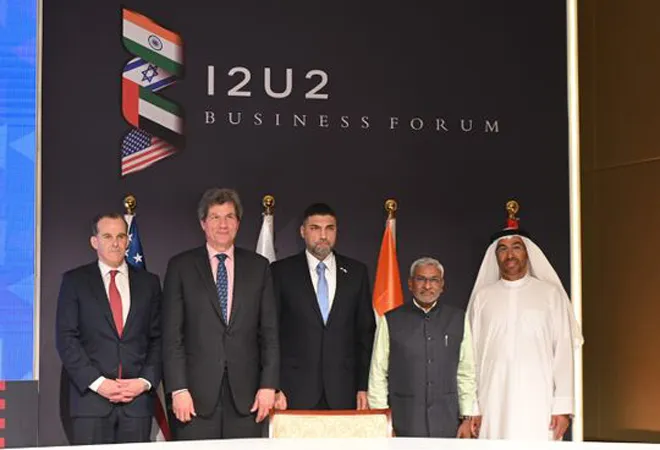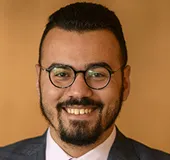
The I2U2 Business Forum,
inaugurated in Abu Dhabi on 22 February, brought together the member countries of the minilateral partnership known as the I2U2 Group: India, Israel, the United Arab Emirates (UAE), and the United States (US). The group, established in 2022, aimed to foster economic collaboration in various sectors such as technology, energy, transportation, space, and water and food security. This partnership emerged amidst evolving geopolitical dynamics in West Asia (also referred to as the Middle East), including the normalisation of relations between Israel and the UAE and the involvement of India as a significant regional player. Looking ahead, the I2U2 is expected to transform into a security vehicle for the broader West Asia region, responding to major geopolitical shifts. Therefore, the I2U2 Business Forum holds great significance as a step towards establishing a private sector-driven institutional arrangement that could potentially expand regionally through consensus-building.
The economic statecraft of the I2U2 Business Forum
The I2U2 Business Forum facilitates dialogue between governments and private sector representatives of the I2U2 group, promoting business cooperation opportunities. It reflects the positive impact of regional normalization. Ronen Levi, the Director-General at the Israeli Ministry of Foreign Affairs, highlighted how the forum showcases the potential of the Abraham Accords and collaborations for prosperity in the Middle East and beyond. The inaugural session discussed potential partnerships, such as a US$2-billion investment in integrated agricultural facilities in India and the development of a 300-megawatt wind and solar hybrid power plant in Gujarat. The I2U2 Business Forum aims to transform the I2U2 into a platform for cross-regional geopolitical and economic integration in the Middle East, South Asia, or the broader regional landscape,
West Asia. By bringing together member states and their private sector representatives, the Forum provides an opportunity to align the objectives of dynamic regional economies. Unlike traditional multilateral trade agreements focused on regulations and market access, the Forum supports the geoeconomic objectives of the I2U2 Group by facilitating dialogue between policymakers and private sector representatives, as well as mobilising private capital and expertise to enhance collaborative efforts. These geoeconomic objectives are highly ambitious, considering the historical challenges associated with bilateral and multilateral economic cooperation amidst geopolitical tensions.
The inaugural session discussed potential partnerships, such as a US$2-billion investment in integrated agricultural facilities in India and the development of a 300-megawatt wind and solar hybrid power plant in Gujarat.
A new era for trade in Washington
Like the US’ China policy, there has been a significant bipartisan shift in trade policy, propelled by former President Trump and continued by President Biden. This shift involves a preference for industrial sectors and a reluctance to embrace free trade, instead favouring a labour-driven approach. It represents the prevailing direction of the US’ trade approach and is anticipated to persist after the 2024 presidential elections. The era of granting access to the US market in exchange for alignment with American foreign policy is fading. The I2U2 Business Forum is no exception to this shift. With the Forum, the US has chosen a more challenging but more practical path that balances will and capacity. Washington aims to showcase the benefits of US-led trade partnerships while simultaneously undermining China's appeal as an economic partner to actors in West Asia.
Replicating the IPEF in West Asia
The I2U2 Business Forum cannot be compared to traditional trade agreements. It is closer in nature to the Indo-Pacific Economic Framework (IPEF), which aims to strengthen trade and technology cooperation between the US and a number of Asian economies (including India), rather than negotiate market access between states. The IPEF is
dedicated to promoting resilience, sustainability, inclusiveness, economic growth, fairness, and competitiveness among the US and its Pacific partners. It is comprised of several member states, including the US, Australia, Brunei Darussalam, Fiji, India, Indonesia, Japan, the Republic of Korea, Malaysia, New Zealand, the Philippines, Singapore, Thailand, and Vietnam. The Framework
rests upon four fundamental pillars: connected economy, resilient economy, clean economy, and fair economy. Future negotiations will focus on trade, supply chains, clean energy, decarbonization, infrastructure, and tax and anti-corruption measures. Notably, the IPEF offers partners the flexibility to select and engage in the pillars of their interest rather than mandating participation in all four.
Washington aims to showcase the benefits of US-led trade partnerships while simultaneously undermining China's appeal as an economic partner to actors in West Asia.
The I2U2 Business Forum is comparable to the IPEF for its compatibility with a new era in international trade that exists at the intersection of global geopolitics and economic exchange. As the I2U2 Business Forum advances cross-regional economic integration between its four member states, the opportunity to expand this progress to further West Asian actors and foster increased interconnectedness within the broader region is one that must be pursued. The inclusion of more nations—namely
Egypt and Saudi Arabia—into this geoeconomic and geopolitical framework will be a crucial element of its capacity to transform the economic landscape of West Asia. There are already historical initiatives in the Middle East that can serve as inspiration for cross-regional economic integration within an expanding I2U2 format. One notable example is the Qualifying Industrial Zones (QIZ) established by the US to promote manufacturing operations in Egypt, Jordan, and Israel. These zones were designed to enhance economic interdependence and strengthen political relations beyond the security arrangements of their peace agreements.
India as an economic anchor in West Asia
India’s participation in multilateral economic frameworks is calculated, as illustrated by Delhi’s decision to opt out of the IPEF’s trade pillar. As per Union Commerce Minister Piyush Goyal, India is keeping “the national interest of
people and businesses in mind” with this decision, citing possible “conditionalities” of the Framework that could discriminate against developing nations. The concern lies in potentially binding commitments in environment and labour issues that concern trade. Alternatively, in West Asia, India may be ready for an IPEF-like model that provides India with an increased degree of leadership in the format and, in turn, a greater ability to ensure compatibility with Delhi’s strategic and economic objectives. In this sense, the I2U2 could be the platform that India could use to lead the region economically and cement itself as an economic anchor in West Asia. An expanded format would also welcome regional partners Egypt and Saudi Arabia to leverage further collaboration under a minilateral architecture that aligns with the geoeconomic vision that India and the other I2U2 members have consolidated.
The Forum can play a key role in initiating the process by highlighting the significance of adopting market-friendly policies that attract investment, skilled professionals, and advanced technologies to the region.
Conclusion
The initial focus of establishing a West Asian regional framework should be to prioritise economic integration. Although this process may require a significant amount of time, it is crucial, to begin with the I2U2 Business Forum. The Forum can play a key role in initiating the process by highlighting the significance of adopting market-friendly policies that attract investment, skilled professionals, and advanced technologies to the region. Its objective should be to encourage institutional frameworks and business networks that gradually lead to economic integration, promoting regional interdependence. In the long term, the I2U2 Business Forum has the potential to expand its membership to include other regional powers and adopt an incremental approach that effectively represents the interests of its member states and facilitates meaningful collaboration. By prioritising regional economic integration, the I2U2 Business Forum can establish a strong foundation for a robust West Asian regional architecture that supports sustainable economic development and encourages increased cooperation and interdependence among its participants.
Mohammed Soliman is the director of the Strategic Technologies and Cyber Security Program at the Middle East Institute in Washington.
The views expressed above belong to the author(s). ORF research and analyses now available on Telegram! Click here to access our curated content — blogs, longforms and interviews.



 The I2U2 Business Forum,
The I2U2 Business Forum,  PREV
PREV


